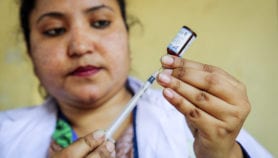By: David Dickson
Send to a friend
The details you provide on this page will not be used to send unsolicited email, and will not be sold to a 3rd party. See privacy policy.
The UK government has endorsed the proposal of an international commission that developing countries should ensure their rules on intellectual property rights (IPR) are adequately adapted to local circumstances — although insisting that this is done within the framework of existing international agreements.
Britain is also advising individual developing countries to look closely at the implications of the IPR regime that they adopt, for example whether allowing broad patents on genetically modified plants and animals could have a negative impact on the lives of poor families.
However it has refrained from openly criticising those who do adopt rigid patents on biotechnological or pharmaceutical inventions. The government accepts that countries aiming to establish their own industries in such fields may seek to boost innovation by copying the IPR regimes followed by developed countries.
The UK’s position was announced today (7 May) in a joint statement by Clare Short, the secretary of state for international development, and Patricia Hewitt, the secretary of state for trade and industry.
They were commenting on the report of an independent commission set up by Short two years ago to look at how IPR rules could be developed and implemented to take greater account of the interests of developing countries and poor people. It was chaired by John Barton, professor of law at the Stanford University, United States.
The IPR Commission’s report was published last September, and emphasised the need for flexibility in the way that developing countries draw up their IPR regulations, stressing in particular some of the negative aspects of excessively rigid rules in this area (see Patents 'could hinder poverty reduction', 12 September 2002).
Not surprisingly, given that the Department of Trade and Industry tends to reflect the interests of British industry — including its biotechnology sector — the UK’s official response to the report is more muted in its concerns about the functioning of the international IPR system. In stresses, for example, that developing countries will need to consider, among other things, “the role patent protection could have in stimulating investment in research”.
Nevertheless its endorsement of the Commission’s call for flexibility, and the way that it highlights certain issues that developing countries should at least consider seriously before making their own laws — such as the scope of, and alternatives to, patents — will provide useful support for those campaigning for significant changes in this area.
“We are pleased with the UK’s reaction to the report, and that for the first time a major developed country is saying that patents may not always be good for developing countries,” says Ruchi Tripathi of the development organisation ActionAid.
This apparent shift in the UK position in seen as particularly significant in the context of discussions about the impact of international agreements such as that on Trade-Related aspects of Intellectual Property Rights (TRIPS).
The UK government confirms that it “remains firmly committed to the effective protection of IPRs in order to stimulate continued innovation and creativity”. But it also points out that this is “consistent with the use of various flexibilities in the TRIPS agreement by developing countries”.
Finally the UK government says that it agrees with the Commission’s conclusion that there is a case for more and better-coordinated research on the impact of intellectual property rights in developing countries.
This is a response to the Commission’s proposal for an international initiative bringing together research sponsors, developing country governments, development agencies and academic organisations in the IPR field to identify and co-ordinate research priorities, share knowledge and facilitate wider dissemination of findings. The government promises that “DFID will investigate with potential partners the possibility of defining and taking forward such an initiative”.
© SciDev.Net 2003
Related external links:













